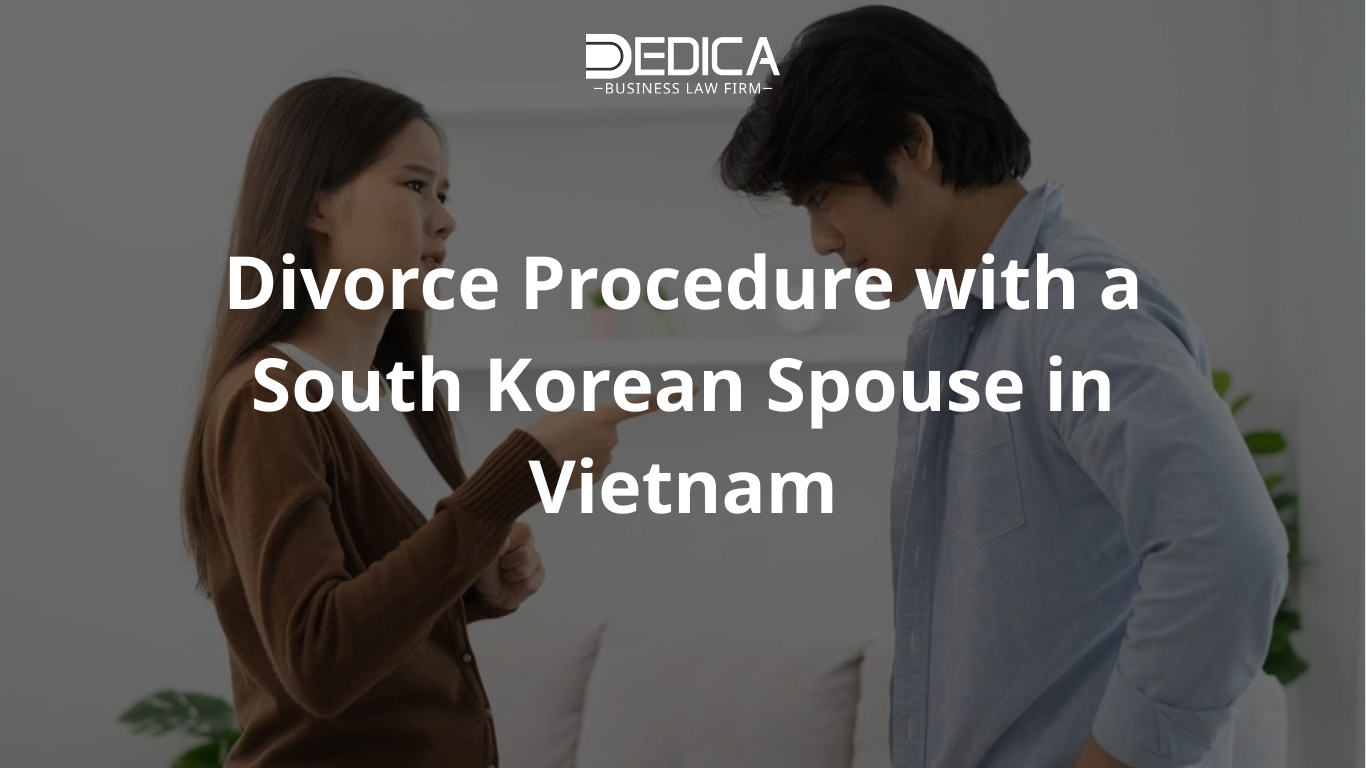Divorce Procedure with a South Korean Spouse in Vietnam
Are you looking to understand the divorce procedure with a South Korean spouse in Vietnam and worried about its complexity? Don’t worry — this article walks you through every step clearly and simply, so you can confidently prepare your documents and proceed at a Vietnamese court.
1. Who Has Jurisdiction in Divorce Cases with a South Korean National in Vietnam?
Divorce involving a foreigner — including South Korean citizens — falls under the jurisdiction of Vietnamese courts, based on the 2014 Law on Marriage and Family and the 2015 Civil Procedure Code. If one party is a Vietnamese citizen or the foreign spouse resides long-term in Vietnam, a Vietnamese court has jurisdiction.
Specific jurisdiction: The People’s Court at the provincial level where the respondent resides or last resided before leaving Vietnam. If this cannot be determined, the petitioner may file at the court of their own current residence.
2. Preparing Divorce Documents: Mutual Consent or Unilateral Filing
2.1 Common Documents for Both Types:
Petition for recognition of mutual consent divorce (using the correct form) — in mutual cases.
Divorce petition — in unilateral cases.
Original marriage certificate. If the marriage was registered in South Korea, it must be registered (noted) in Vietnam before filing for divorce.
Certified copies of ID/Passport of both spouses.
Certified copies of household registration, temporary residence book, or temporary residence card.
Birth certificate of children (if any).
Evidence of shared property (if any).
2.2 Additional Documents When One Spouse Resides in South Korea:
Application for trial in absentia.
Written statement from the South Korean spouse expressing their opinion.
Power of attorney (if appointing a legal representative), with certified translation.
All documents issued in South Korea must be translated, notarized, and legalized for use in Vietnam.
3. Filing Process and Court Proceedings in Vietnam
Submit documents: File with the provincial-level People’s Court with jurisdiction. You may submit in person, by post, or via an online portal (if supported).
Dossier assessment & court fee: Within 8 working days, the court will review the dossier. If valid, you’ll receive a notice to pay court fees. Once paid, the court will officially accept the case.
Mediation session: Required in mutual divorce cases. If successful, the court will issue a decision within 7 days — effective immediately. If unsuccessful, the case proceeds as a unilateral divorce.
For absent spouses, the court will not conduct mediation if a valid application for trial in absentia is submitted.
Unilateral divorce: The court will verify the respondent’s address. If needed, judicial entrustment procedures are carried out. The court will then hold a first-instance trial.
The verdict becomes enforceable 30 days after issuance (or upon receipt by the absent party). An appeal may be filed within 15 days by either party.
4. Special Notes
If the divorce was finalized in South Korea, you must obtain the final divorce judgment legalized for recognition in Vietnam.
In cases involving children, the South Korean spouse must prepare child custody documents if they intend to take the child abroad, including the court decision, child’s birth certificate, passport, and an exit application verified by the competent authorities.
5. Quick FAQ:
Which court handles divorce with a South Korean spouse? The People’s Court at the provincial level where the South Korean spouse last resided in Vietnam. If unclear, file at the court where the Vietnamese spouse currently resides.
How long does a unilateral divorce take? Usually around 4 months from the acceptance date. It may take longer if judicial entrustment or other complications arise.
Are documents from South Korea required to be translated and legalized? Yes. All foreign documents must be translated, notarized, and legalized to be accepted in Vietnamese courts.
Can mediation be skipped in absentia cases? Yes, if there’s a valid request for trial in absentia, the court will not conduct mediation.
Conclusion
Divorce is a journey no one wishes for, and it becomes even more layered when a foreign element — like a South Korean spouse — is involved. But you don’t have to walk it alone. What matters most is knowing what to do, what to prepare, and who to trust. If you’re standing at this legal crossroads, let DEDICA Law Firm be your trusted partner. With extensive experience in international divorce proceedings, we’re committed to helping you handle your case smoothly, lawfully, and with minimal stress.
Contact DEDICA Law Firm for expert legal consultation!
📞 Hotline: (+84) 39 969 0012 (Available on WhatsApp, WeChat, and Zalo)
🏢 Head Office: 144 Vo Van Tan Street, Xuan Hoa Ward, Ho Chi Minh City (144 Vo Van Tan Street, Vo Thi Sau Ward, District 3, Ho Chi Minh City)
🕒 Business Hours: Monday – Friday (8:30 AM – 6:00 PM)
Reach out today for a free initial consultation with our team of professional lawyers!






